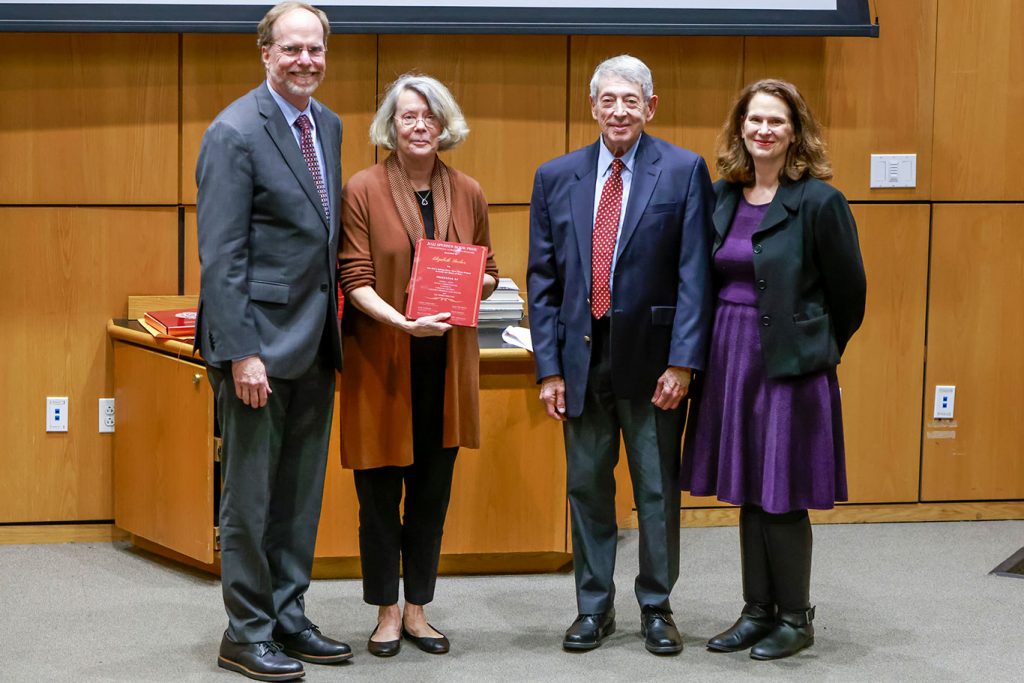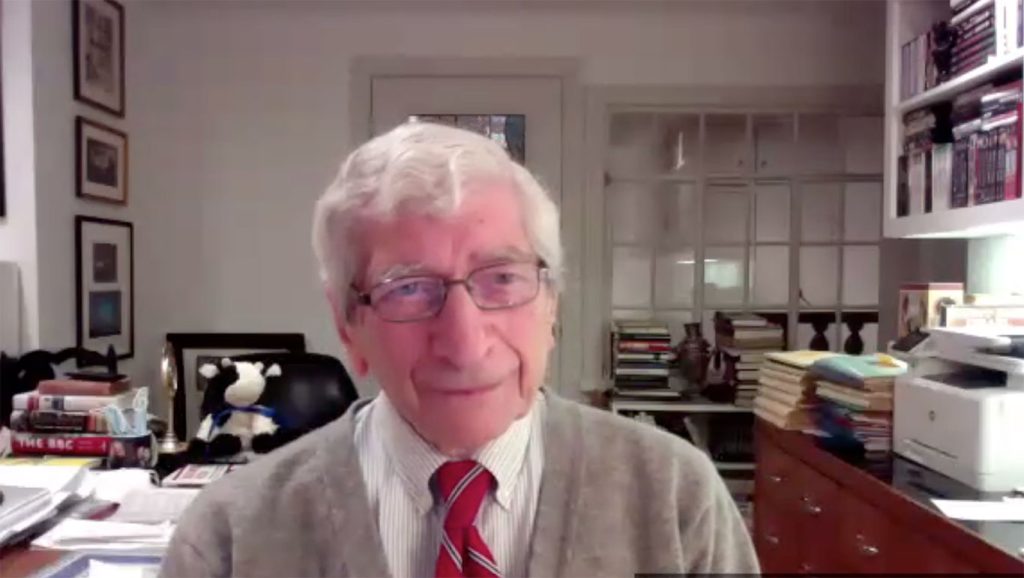Photos by Marisol DiazElizabeth Becker and Marvin Kalb, two esteemed correspondents whose reporting shed light on developments in Russia and Southeast Asia during the 1960s and 1970s, were honored on Nov. 7 at a ceremony at Fordham’s Lincoln Center campus.
Becker, who covered Cambodia for the Washington Post, was awarded the Sperber Prize for her biography You Don’t Belong Here: How Three Women Rewrote the Story of War (Public Affairs, 2022). Kalb was awarded a certificate of achievement for his distinguished career in journalism and two memoirs: Assignment Russia: Becoming a Foreign Correspondent in the Crucible of the Cold War, (Brookings, 2022) and The Year I Was Peter the Great, (Brookings, 2018).
The Sperber Prize, given annually for biographies and memoirs that focus on a professional in journalism, has been presented annually by Fordham’s Department of Communication and Media Studies since 1999.
Breaking Out of the ‘Pink Ghetto’
Becker said she wanted to highlight how her subjects—Frances Fitzgerald, Kate Webb, and Catherine Leroy—broke the thickest glass ceiling in journalism by covering the Vietnam War, and in doing so, paved the way for women such as herself. They hailed from three different countries and came from radically different backgrounds, but all three paid their own way to get to Vietnam, and with little formal training, broke out of the “pink ghetto” of fashion, food, and family coverage that women journalists were confined to at the time.
Their outsider status was key, she said, to their ability to look beyond the battlefield, where their male counterparts had been trained to focus their coverage.
“So, you had ultimately with these three women an approach to war that included the whole country, the society, the people,” she said.
“Catherine Leroy spent a lot of time in the field, and she didn’t just take pictures of battle. She took a lot of pictures of soldiers waiting, soldiers being afraid, soldiers being in anguish when they went into battle, soldiers praying with the pastor, reading their mail.”

War Reporting Takes its Toll
Although they found some semblance of success and recognition—Webb won the George Polk award and Fitzgerald won the Pulitzer—Webb and Leroy both suffered from PTSD, and all three had messy personal lives that Becker did not shy away from in her writing. She noted that none of the women expressed regrets about going to Vietnam.
“One of the big gifts for me in writing this book was that I felt it was really good for me as a woman to be a part of all that that,” she said.
“There was something that we could all be proud of, and I wanted to show that they not only broke the ceiling, but they changed journalism as well.”
Remembering Murrow and His Report on Buchenwald
Kalb, who appeared via Zoom, said he was touched to be honored with an award connected to famed journalist Edward R. Murrow. The Sperber Prize is given in honor of the late Ann M. Sperber, the author of the critically acclaimed biography Murrow: His Life and Times (Fordham University Press, 1999).
Kalb was the last person who Murrow hired at CBS News, and he said his favorite anecdote about Murrow was how in 1945, he visited the Buchenwald Concentration camp and saw for the first time what a death camp looked like.
“Murrow was overwhelmed, and when he went back to his hotel room and to sit down to write his piece, he couldn’t do it. I don’t know whether it was two days or three, but it took him a while before he could absorb what he had seen, and be able to present it adequately to the American people on radio,” he said.

An Appreciation for Khrushchev
Today’s broadcast journalists would not be given the same opportunity, he said, and he noted that in writing the third memoir of his time in Russia, which he’s doing now. the benefit of time has given him a better appreciation for Nikita Khrushchev, the First Secretary of the Communist Party of the Soviet Union from 1953 to 1964. Khrushchev is a major focus of all three of his memoirs.
It’s hard to believe that Khrushchev was so foolish to believe he could move missiles and 50,000 Soviet troops into Cuba without the United States noticing—thus triggering the Cuban Missile Crisis in 1962, he said. But Kalb, who covered the crisis as a new reporter, has come around to respect him now, particularly compared to current Russian president Vladimir Putin.
“He was the one Communist leader who recognized that he had made a profound mistake, and he publicly apologized and pulled the missiles out of Cuba and saved the world from a nuclear confrontation,” he said.
“I take my hat off to him this many years later. I don’t know any other Communist leader, perhaps even non-Communist leader, who would have had the guts to do that.”
“I’m a year away from finishing this third memoir, and it is fun, it is exciting, and I thank all of the Sperber committee for thinking about me for this award.”
]]>Published by PublicAffairs, Becker’s biography tells the long-buried story of three extraordinary female journalists who permanently shattered the barriers to women covering war—American Frances FitzGerald, Australian Kate Webb, and French national Catherine Leroy. The three women arrived in Vietnam with strikingly different life experiences, but one common goal: to shed light on what was actually happening in the conflict in Southeast Asia. “At a time when women were considered unfit to be foreign reporters, Frankie, Catherine and Kate paid their own way to war, arrived without jobs, challenged the rules imposed on them by the military, ignored the belittlement and resentment of their male peers and found new ways to explain the war through the people who lived through it,” as Becker’s website explains.
Elizabeth Becker began her career as a war correspondent for the Washington Post in Cambodia. She has been the Senior Foreign Editor for National Public Radio and a New York Times correspondent covering national security, economics and foreign policy. She has won accolades from the Overseas Press Club, DuPont Columbia’s Awards and was part of the Times team that won the Pulitzer Prize for Public Service for coverage of 9/11. She is previously the author of When the War was Over: Cambodia and the Khmer Rouge Revolution, the classic history that has been in print for 35 years; and Overbooked: The Exploding Business of Travel and Tourism, an expose of the travel industry that was an Amazon book of the year. More about her work and career can be found at www.elizabethbecker.com.
Fordham Associate Professor of Communication and Media Studies Beth Knobel, director of the Sperber Prize, said that Becker’s book stood out, even among the excellent works that were finalists for the 2022 Sperber Prize. “Our jurors had effusive praise for the research and writing of You Don’t Belong Here,” she explained. “The book shed light on the work of three brilliant journalists, two of whom are little known in the United States. Becker not only did a wonderful job of bringing their stories to life, but she also contextualized Fitzgerald, Webb and Leroy’s accomplishments in the larger history of the Vietnam conflict. More importantly, Elizabeth Becker also managed to humanize all those caught up in the war. The book makes a huge contribution to both journalism studies and history.”
The Sperber Prize jury will also award a certificate of achievement to Marvin Kalb for his distinguished career in journalism and his two recent memoirs. Assignment Russia: Becoming a Foreign Correspondent in the Crucible of the Cold War, was a finalist for the 2022 Sperber Prize, and his previous memoir, The Year I Was Peter the Great, was also considered for the 2018 Sperber Prize. Both were published by the Brookings Institution Press.
Assignment Russia, Kalb’s second memoir of his years living in the Soviet Union, presents a personal journey through some of the darkest moments of the Cold War and the early days of television news. Kalb not only describes what it was like to try to manage his work and life under the Soviet system, but also gives new insights into the work of CBS News in the US during the late 1950s. Kalb’s distinguished journalism career spans more than 30 years and includes award-winning reporting for both CBS and NBC News as chief diplomatic correspondent, Moscow bureau chief, and anchor of NBC’s Meet the Press. He is professor emeritus at Harvard University and hosts The Kalb Report at the National Press Club. He is also a nonresident senior fellow with the Foreign Policy program at Brookings.
Kalb was the last person hired by famed journalist Edward R. Murrow at CBS News, creating a special connection to the Sperber Prize—which is given in honor of the late Ann M. Sperber, the author of the critically acclaimed biography Murrow: His Life and Times. One edition of that work was published by Fordham University Press, connecting the Sperber family to the university. Through the generous support of Ann’s mother Lisette, the $1,000 award was established to promote and encourage biographies and memoirs that focus on a professional in journalism. The award has been presented annually by Fordham University’s Department of Communication and Media Studies since 1999.
Five biographies and one memoir were chosen as the finalists for the Sperber Prize, including the books by Becker and Kalb. More than 60 works with 2021 copyrights were considered.
The other finalists for this year’s prize, in alphabetical order, were:
- Melanie Kirkpatrick’s Lady Editor: Sarah Josepha Hale and the Making of the Modern American Woman, published by Encounter Books.
- Judith Mackrell’s The Correspondents: Six Women Writers on the Front Lines of World War II, published by Doubleday.
- Lisa Napoli’s Susan, Linda, Nina and Cokie: The Extraordinary Story of the Founding Mothers of NPR, published by Abrams.
- Donald A. Ritchie’s The Columnist: Leaks, Lies, and Libel in Drew Pearson’s Washington, published by Oxford University Press.
Previous winners of the Sperber Prize include Working by Robert Caro, Fire Shut Up in My Bones by Charles M. Blow, Cronkite by Douglas Brinkley, Lives of Margaret Fuller by John Matteson, Reporter by Seymour M. Hersh, The Publisher: Henry Luce and His American Century by Alan Brinkley, Avid Reader: A Life by Robert Gottlieb, and All Governments Lie! The Life and Times of Rebel Journalist I.F. Stone by Myra MacPherson. In 2021, the Sperber Prize was awarded to two biographies, Kerri K. Greenidge’s biography Black Radical: The Life and Times of William Monroe Trotter and Lesley M. M. Blume’s FALLOUT: The Hiroshima Cover-up and the Reporter Who Revealed It to the World about war correspondent John Hersey.
More information about the award, its jury, and its history can be found at Sperberprize.com. With questions, please contact Dr. Beth Knobel at [email protected] or 718-817-5041.
]]>